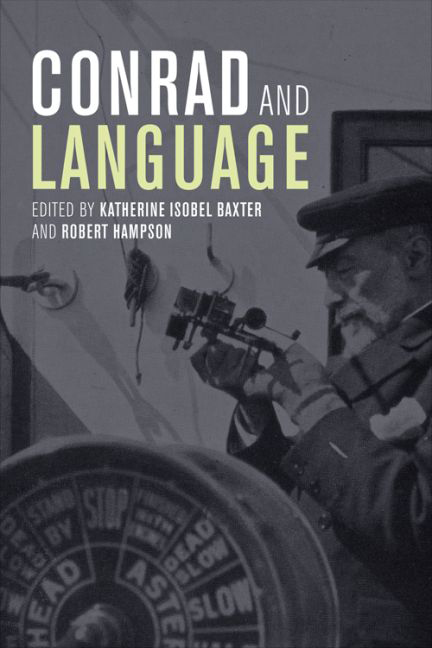Book contents
- Frontmatter
- Contents
- A Note on Texts
- Introduction
- 1 Conrad and Nautical Language: Flying Moors and Crimson Barometers
- 2 Navigating the ‘Terroristic Wilderness’: Conrad's Language of Terror
- 3 Conrad, G. E. Moore and Idealism
- 4 Conrad's Language of Passivity: Unmoving towards Late Modernism
- 5 The Powers of Speech in Conrad's Fiction
- 6 ‘Soundless as Shadows’: Language and Disability in the Political Novels
- 7 Conrad and Romanised Print Form: From Tuan Almayer to ‘Prince Roman’
- 8 Languages in Conrad's Malay Fiction
- 9 Gallicisms: The Secret Agent in Conrad's Prose
- 10 ‘The speech of my secret choice’: Language and Authorial Identity in A Personal Record
- 11 The Russian Redemption of The Secret Agent and Under Western Eyes
- Afterword
- Contributors
- Index
9 - Gallicisms: The Secret Agent in Conrad's Prose
Published online by Cambridge University Press: 12 September 2017
- Frontmatter
- Contents
- A Note on Texts
- Introduction
- 1 Conrad and Nautical Language: Flying Moors and Crimson Barometers
- 2 Navigating the ‘Terroristic Wilderness’: Conrad's Language of Terror
- 3 Conrad, G. E. Moore and Idealism
- 4 Conrad's Language of Passivity: Unmoving towards Late Modernism
- 5 The Powers of Speech in Conrad's Fiction
- 6 ‘Soundless as Shadows’: Language and Disability in the Political Novels
- 7 Conrad and Romanised Print Form: From Tuan Almayer to ‘Prince Roman’
- 8 Languages in Conrad's Malay Fiction
- 9 Gallicisms: The Secret Agent in Conrad's Prose
- 10 ‘The speech of my secret choice’: Language and Authorial Identity in A Personal Record
- 11 The Russian Redemption of The Secret Agent and Under Western Eyes
- Afterword
- Contributors
- Index
Summary
The macaronic quality of Conrad's prose is a well-documented dimension of his writings, be they fictional or epistolary, and testimonies that he regularly indulged in the habit of mixing several languages in oral conversation also abound. H. G. Wells recalled that Conrad ‘spoke English strangely’. Wells went on to say that, ‘He would supplement his vocabulary – especially if he were discussing cultural or political matters – with French words.’ French idioms clearly came naturally to Conrad and were always relevant, but what makes their status problematic is when they are, as it were, smuggled into the English language through faulty translations, so that to many readers Conrad's English frequently sounded awkward. George Orwell sums up his impression of Conrad's convoluted language: ‘He used I believe to think in Polish and then translate his thoughts into French and finally into English.’
Conrad's compulsion to switch from one language to another in the same sentence may originate from different needs. The first one might be to supplement what he found himself momentarily unable to express in the master language of his medium, namely English, by resorting to an idiom with which he was more familiar. To be sure, most of the time the language that fulfilled this function turned out to be French, but he could sporadically use German, Italian or Spanish phrases if need be. This simply goes to show that Conrad could sometimes find it arduous to channel his thoughts through English words. He not infrequently bemoaned his lack of mastery of the language. However, if this reaction is easily understood in an oral context, things are different in a written one because the writer is always free to correct, amend, erase what he considers to be a betrayal of his intention and ultimately scrap everything and start all over again or even enlist the help of competent friends. Yet Conrad kept complaining that English eluded his literary control.
- Type
- Chapter
- Information
- Conrad and Language , pp. 151 - 167Publisher: Edinburgh University PressPrint publication year: 2016

